
Kirsten McCarthy / Cats.com
Adding prebiotics to your cat’s diet could improve their digestive health and boost their immune system. Prebiotics are a food source for the friendly bacteria in your cat’s gut that make up their microbiome. They help the good bacteria flourish and keep the bad bacteria at bay. Once broken down, they also nourish the cells in your cat’s intestinal wall – an important part of your cat’s immune defences.
Prebiotics offer health benefits to all cats. But if your cat suffers from digestive issues, immune problems, or has had recent antibiotics, they could really help. Read on for everything you need to know about prebiotics and how they could boost your cat’s overall health.
Understanding Prebiotics and Your Cat’s Microbiome

If your cat’s microbiome is disrupted, harmful bacteria can overgrow, leading to a range of health problems, including chronic diarrhea. Kirsten McCarthy / Cats.com
We tend to think of microbes, like bacteria and yeast, as something to be avoided in case they make us unwell. However, they are actually vital to our – and our cat’s – health.
Like us, your cat’s body contains millions of microorganisms (bacteria and yeasts), forming their microbiome. Many of these live in their digestive tract, making up the gut microbiome.
When your cat’s microbiome is unbalanced or disrupted – for instance, after a tummy upset or antibiotic treatment – there can be an overgrowth of bad bacteria, called dysbiosis. This leads to a variety of health problems, from chronic gastrointestinal issues to diabetes and even cancer.
How do Prebiotics Help the Microbiome?
Prebiotics are like food for the friendly bacteria in your microbiome, helping them to thrive. They are found in fiber (foods like chicory root and pumpkin) that your cat can’t digest. Instead, they are a food source for the beneficial bacteria in their gut, helping them to grow and boosting their activity. As the population of helpful bacteria grows, the population of unhelpful bacteria reduces, keeping your cat’s microbiome healthy.
Once broken down by bacteria, prebiotics can also nourish the cells in the lining of your cat’s intestine. This improves the health of your cat’s gut, allowing for better nutrient absorption. It also strengthens the gut wall barrier – a fundamental part of your cat’s immune defences.
What is the Difference Between Prebiotics and Probiotics?
You’ve probably heard of probiotics – both for people and pets. But how are they different to prebiotics?
- Probiotics are live, healthy microbes that can be added to your cat’s diet as supplements or in specialized foods. They aim to add to the population of good bacteria in your cat’s microbiome.
- Prebiotics provide the nourishment for these good bacteria to flourish.
- Synbiotics are products that contain both prebiotics and probiotics. They aim to enhance the function of both by adding healthy bacteria (probiotics) alongside the nutrition they need to survive and thrive in the gut (prebiotics).
What are the Benefits of Prebiotics in Cats?

Prebiotics have a huge range of potential benefits, although research proving their effects in cats is still limited. Kirsten McCarthy / Cats.com
There aren’t many scientific studies about the effect of prebiotics in cats yet. But, extrapolating from human research, they are thought to have a range of possible benefits both through their impact on the microbiome and as a source of fibre. Where available, we have highlighted the most recent scientific research to support these claims in cats.
Improved Stool Consistency
As a type of fibre, prebiotics improve stool consistency, helping stools move comfortably through the digestive tract. This benefits cats with both diarrhea and constipation.
Although research into prebiotics use in cats is limited, a recent study showed that prebiotic Psyllium husk powder increases defecation frequency and faecal score, bulk, and moisture in healthy cats. This effect was also seen in a previous study on cats with constipation, making psyllium husk powder an evidence-based treatment for cats with constipation.
The bulking effect of prebiotics also helps cats with anal gland issues, as stools need to be appropriately firm to empty the anal gland as they move past.
Enhances the Health of the Intestinal Wall
When prebiotics are broken down (fermented) by the bacteria in the gut, they produce short-chain fatty acids (SCFAs) such as Butyrate. This nourishes and heals the intestinal wall, improving the absorption of nutrients, especially useful in cats with conditions such as inflammatory bowel disease (IBD), colitis, or bowel cancer.
Research in people has found that butyrate has anti-carcinogenic (anti-cancer) and anti-inflammatory effects on the large intestine.
The positive effect of prebiotics on the intestinal wall also strengthens the gut-wall barrier, preventing harmful substances from being absorbed into the bloodstream and causing illness.
Supports the Gut Microbiome
Your cat’s microbiome is essential to their health and well-being. But many factors can disrupt it, including:
- Antibiotic treatment
- Gastrointestinal infections
- Digestive upsets
- Chronic diarrhea eg. cats with IBD, irritable bowel syndrome (IBS), food sensitivities and allergies
- Stress
- Dietary changes
Prebiotics promote a healthy gut microbiome by nourishing the good bacteria in your cat’s gut, helping their population to grow and increasing their activity. This restricts the growth of harmful bacteria, leading to a restoration of a healthy balance of microbes. When broken down (fermented) in the gut, they also lower the pH of the intestine. This acidic environment favors the friendly bacteria, allowing them to thrive.
There is research to back up this claim, with studies finding an increase in healthy bacteria such as Bifidobacterium species in cats given prebiotics.
Strengthens the Immune System
Your cat’s microbiome is vital to their immune system. By promoting the growth of beneficial bacteria, the population of harmful bacteria is reduced, protecting your cat from illness.
Once broken down, prebiotics also provide energy and nourishment to the cells in your cat’s intestinal wall. This strengthens the gut-wall-barrier, an important part of your cat’s immune defences that prevents harmful substances from being absorbed from inside the gut into your cat’s bloodstream.
In cats with leaky gut syndrome, this barrier is more permeable than it should be, meaning infection and toxins can be absorbed into the bloodstream, causing your cat to become unwell.
Supports Maintenance of a Healthy Body Weight
As a type of fibre, prebiotics can aid weight loss by helping cats feel full for longer. But there may be more to it than just appetite control.
We know there is a link between an imbalance of bacteria in the microbiome and being overweight or underweight in people. Although not studied in cats, research into the effects of prebiotics on weight loss in obese people has shown promising results. So, it may be the same in our cats, too.
What are the Different Types of Prebiotics for Cats?
Prebiotics are types of soluble fibre (oligosaccharides and inulin) found in foods such as:
- Soybeans
- Oats
- Beet pulp
- Tomatoes
- Chicory root
- Jerusalem artichokes
- Sweet potato
- Pumpkin
- Psyllium Husk
- Flaxseed
- Beans
- Peas
- Wheat aleurone
How to Choose a Prebiotic for Your Cat

You can easily add a prebiotic supplement to your cat’s usual diet as a powder, liquid, or capsule. Products that contain both prebiotics and probiotics may be the most helpful. Kirsten McCarthy / Cats.com
Prebiotics can be beneficial long-term, as part of your cat’s usual diet, or short-term, to aid in recovery from a digestive upset or antibiotic treatment.
High-quality cat foods should already include fibre that contains prebiotics in their ingredients, so you may not need to change your cat’s diet. However, specialized gastrointestinal diets often contain higher amounts of prebiotics to support cats with sensitive tummies. You can also add a daily prebiotic supplement to your cat’s diet in the form of a liquid, powder, tablet, or capsule. Many products contain a combination of prebiotics and probiotics, which can be even more effective.
When choosing a prebiotic, go for a trusted brand with research to back-up their product’s claims. Remember to check with your veterinarian before altering your cat’s diet and make any changes gradually to avoid a tummy upset.
What are the Side Effects of Prebiotics in Cats?
Prebiotics are generally considered safe in cats. However, it is important to note that supplements are not subject to the same quality control or safety trials as medications.
The most common side effects of prebiotics in cats are flatulence and abdominal discomfort, due to increased gas production.
-
Agraham. (2022, May 25). Prebiotics and probiotics for dogs and cats. Today’s Veterinary Nurse.
-
Cvpm, S. W. R. (2022, April 6). Probiotics, prebiotics, synbiotics, and intestinal health of dogs and cats. Today’s Veterinary Practice.
-
Kanakupt, K., Boler, B. M. V., Dunsford, B. R., & Fahey, G. C. (2011). Effects of short-chain fructooligosaccharides and galactooligosaccharides, individually and in combination, on nutrient digestibility, fecal fermentative metabolite concentrations, and large bowel microbial ecology of healthy adults cats. Journal of Animal Science, 89(5), 1376–1384. https://doi.org/10.2527/jas.2010-3201
-
Keller, E., Laxalde, J., Tranier, N., Von Kretschmann, P. B., Jackson, A., & Van Hoek, I. (2024). Psyllium husk powder increases defecation frequency and faecal score, bulk and moisture in healthy cats. Journal of Feline Medicine and Surgery, 26(4). https://doi.org/10.1177/1098612x241234151
-
Knudsen, K. E. B., Serena, A., Canibe, N., & Juntunen, K. S. (2003). New insight into butyrate metabolism. Proceedings of the Nutrition Society, 62(1), 81–86. https://doi.org/10.1079/pns2002212
-
Nestlé Purina Petcare Company. (n.d.). Prebiotics. Purina Institute.
-
Othman, R. B., Amor, N. B., Mahjoub, F., Berriche, O., Ghali, C. E., Gamoudi, A., & Jamoussi, H. (2023). A clinical trial about effects of prebiotic and probiotic supplementation on weight loss, psychological profile and metabolic parameters in obese subjects. Endocrinology Diabetes & Metabolism, 6(2). https://doi.org/10.1002/edm2.402
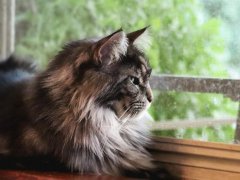
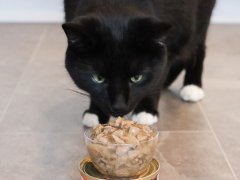
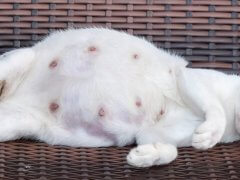
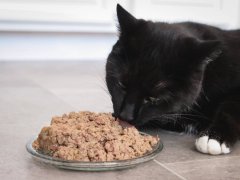


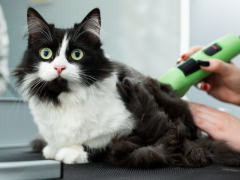
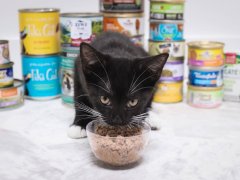
Can you recommend a really good quality symbiotic?
Purina Pro Plan Veterinary Diets FortiFlora or Nutramax Proviable DC would be a good place to start